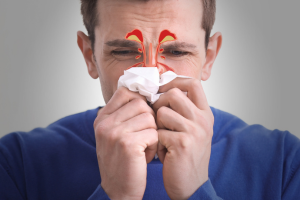Sinus infections and COVID-19 are both respiratory illnesses that can cause similar symptoms. However, it’s important to correctly identify which one you have to receive appropriate treatment and care. This article will explore the key differences between sinus infections and COVID-19, helping you to determine the underlying cause of your symptoms.
Overview of Sinus Infections
What is a sinus infection (sinusitis)?
Sinusitis is a condition characterized by the inflammation of the sinuses. This inflammation can be caused by various factors, including bacteria, viruses, or allergens. When the sinuses become blocked or inflamed, it can lead to a buildup of mucus and pressure, resulting in a range of uncomfortable symptoms.<
Common symptoms:
- Congestion: This is often the most noticeable symptom, as it can cause a feeling of fullness or stuffiness in the nose and sinuses.
- Facial pressure: The pressure can be felt in the cheeks, forehead, or around the eyes, depending on the location of the affected sinuses.
- Headache: Headaches are common in cases of sinusitis, and they can be throbbing or dull.
Explanation of acute vs. chronic sinusitis:
- Acute sinusitis: This type of sinusitis lasts for up to four weeks. A viral infection typically causes it, but bacteria can also be involved.
- Chronic sinusitis: This occurs when symptoms persist for more than 12 weeks. It can be caused by a variety of factors, including allergies, structural abnormalities, or infections.
Also Read: How Do Sinus Infections Affect Your Respiratory Health?
Overview of COVID-19
What is COVID-19?
COVID-19, short for Coronavirus Disease 2019, is a viral respiratory illness caused by the SARS-CoV-2 virus. This virus spreads through respiratory droplets when an infected person coughs, sneezes, or talks.
Common symptoms:
- Fever: This is often one of the first signs of COVID-19 and can be accompanied by chills.
- Cough: A dry cough is a common symptom and may worsen over time.
- Difficulty breathing: Shortness of breath or trouble breathing can be a more severe symptom.
It’s important to recognize the symptoms of COVID-19 as early as possible to help prevent the spread of the virus. If you experience any of these symptoms, isolating yourself and seeking medical advice is important. Early diagnosis and treatment can help reduce the severity of illness and protect others from infection.
Key Similarities Between Sinus Infections and COVID-19
Overlapping symptoms that can cause confusion:
- Congestion: Both sinus infections and COVID-19 can cause nasal congestion, making it difficult to breathe through the nose.
- Headache: Headaches are a common symptom of both conditions, often due to inflammation and pressure in the sinuses or head.
- Fatigue: Feeling tired and exhausted is a frequent symptom of both sinus infections and COVID-19.
- Sore throat: A sore throat can be a symptom of both conditions, particularly when the infection is located in the upper respiratory tract.
- Loss of smell: Loss of smell, or anosmia, is a common symptom of COVID-19 and can also occur in some cases of sinusitis.
Also Read: Allergies or Sinusitis: Warning Signs It’s Time to See an ENT
How to Spot the Differences: Sinus Infection vs. COVID-19
Sinus Infection-Specific Symptoms
- Facial pain/pressure: This is a common symptom of sinus infections and is typically located around the eyes, forehead, and cheeks.
- Thick, discolored nasal discharge: The mucus produced during a sinus infection is often thick and discolored, usually yellow or green.
- Post-nasal drip: This occurs when mucus drains down the back of the throat, causing irritation and discomfort.
- Tooth pain or ear pressure: In some cases, sinus infections can cause pain in the teeth or ears, especially if the infection is located in the maxillary sinuses (near the cheeks).
- Symptoms often worsen when bending forward: This is because bending forward can increase pressure on the sinuses.
COVID-19-Specific Symptoms
- Fever or chills: While fever is less common with sinus infections, it is a hallmark symptom of COVID-19.
- Dry cough: A dry cough is a common symptom of COVID-19, but it is rare in sinus infections.
- Shortness of breath or difficulty breathing: This is a serious sign of COVID-19 and should be evaluated by a healthcare professional.
- Muscle or body aches: These symptoms are more typical in COVID-19 than in sinus infections.
- Gastrointestinal symptoms: Diarrhea, nausea, or vomiting can occasionally occur in COVID-19.
- Loss of taste and smell: While loss of taste and smell can occur with both sinus infections and COVID-19, a sudden loss is more strongly associated with COVID-19.
Also Read: Understanding Non-Allergic Sinusitis: Causes, Symptoms, and Effective Treatments
Risk Factors and Triggers
Sinus Infections
Seasonal allergies: People with allergies to pollen, dust, or other allergens are at a higher risk of developing sinus infections, as these allergens can trigger inflammation in the nasal passages and sinuses.
- Cold and flu season: The incidence of sinus infections tends to increase during the cold and flu season, as viruses that cause these illnesses can also lead to sinusitis.
- Environmental irritants: Exposure to environmental irritants such as dust, pollution, or smoke can irritate the nasal passages and contribute to the development of sinus infections.
COVID-19
- Recent exposure to someone infected: The primary risk factor for COVID-19 is exposure to a person infected with the virus.
- Travel to high-risk areas: Traveling to areas with high rates of COVID-19 infection can increase the risk of exposure.
- Unvaccinated or immunocompromised individuals: People who are unvaccinated or have weakened immune systems are at a higher risk of contracting COVID-19.
When to Seek Medical Attention
It’s important to recognize serious symptoms of both sinus infections and COVID-19 and seek medical attention promptly. For sinus infections, severe pain, a high fever, or symptoms that last more than 10 days should prompt a visit to an ENT specialist in Irvine, CA. In the case of COVID-19, difficulty breathing, persistent chest pain, confusion, or blue-tinted lips or face are signs of a more severe infection and require immediate medical attention.
Diagnostic Tests for Sinus Infections and COVID-19
Sinus Infection
A healthcare provider will typically begin by conducting a physical exam to assess the patient’s symptoms and identify any signs of infection. In some cases, nasal swabs may be taken to test for bacteria or viruses. For chronic sinusitis, imaging tests such as a CT scan may be necessary to evaluate the sinuses and identify any underlying structural abnormalities.
COVID-19
COVID-19 testing is essential for diagnosing the infection. There are two main types of COVID-19 tests:
- Polymerase chain reaction (PCR) test: This is considered the gold standard for COVID-19 testing and can detect the virus even in low levels.
- Rapid antigen tests: These tests provide results more quickly than PCR tests but may be less sensitive, particularly in early stages of infection.
If you are experiencing symptoms that overlap with both sinus infections and COVID-19, it’s important to consult with a healthcare provider to determine the most appropriate course of action. They will assess your symptoms and recommend the most suitable test or combination of tests to diagnose your condition.
Treatment Options for Sinus Infections vs. COVID-19
Sinus Infection
- Over-the-counter remedies: Decongestants and nasal sprays can help alleviate symptoms such as congestion and pressure.
- Antibiotics: If a bacterial infection is the cause of the sinusitis, antibiotics may be prescribed to treat it.
- Home remedies: Steam inhalation and saline rinses can help to clear the sinuses and reduce inflammation.
COVID-19
- Isolation and rest: Individuals with COVID-19 should isolate themselves to prevent the spread of the virus and allow their bodies to recover.
- Symptomatic treatments: Over-the-counter medications can be used to manage symptoms such as fever and pain. Staying hydrated is also important.
- Antiviral medications: In severe cases of COVID-19, antiviral medications may be prescribed to help the body fight the virus.
Importance of vaccination
Vaccination is an important tool in preventing the spread of both sinus infections and COVID-19. Flu vaccinations can help reduce the risk of developing sinus infections, while COVID-19 vaccines can significantly lower the risk of severe illness and hospitalization.
Preventive Measures for Sinus Infections and COVID-19
Sinus Infections
- Managing allergies: If you have allergies, taking steps to manage them can help reduce the risk of sinus infections. This may involve avoiding allergens, using allergy medications, or seeing an allergist for treatment.
- Using air purifiers: Air purifiers can help to remove allergens and pollutants from the air, reducing the risk of sinus irritation and inflammation.
- Staying hydrated: Drinking plenty of fluids can help to thin mucus and prevent it from becoming thick and congested.
COVID-19
- Vaccination: Getting vaccinated against COVID-19 is one of the most effective ways to protect yourself and others from the virus.
- Mask-wearing: Wearing a well-fitting mask in public settings can help to reduce the transmission of COVID-19.
- Hand hygiene: Washing your hands frequently with soap and water or using hand sanitizer can help to prevent the spread of germs.
- Social distancing: Maintaining a safe distance from others can reduce your risk of exposure to COVID-19.
Conclusion
Identifying the key differences between sinus infections and COVID-19 is necessary for receiving appropriate treatment and care. Both conditions can cause similar symptoms, but understanding the specific characteristics of each illness can help you make informed decisions about your health.
If you are experiencing symptoms that overlap with sinus infections or COVID-19, it’s important to seek medical advice from Orange Coast ENT Head & Neck Surgery for proper diagnosis and treatment. An ENT specialist in Irvine, CA, can evaluate your symptoms, recommend appropriate tests, and provide guidance on the best course of action.


 Seasonal allergies: People with allergies to pollen, dust, or other allergens are at a higher risk of developing sinus infections, as these allergens can trigger inflammation in the nasal passages and sinuses.
Seasonal allergies: People with allergies to pollen, dust, or other allergens are at a higher risk of developing sinus infections, as these allergens can trigger inflammation in the nasal passages and sinuses.